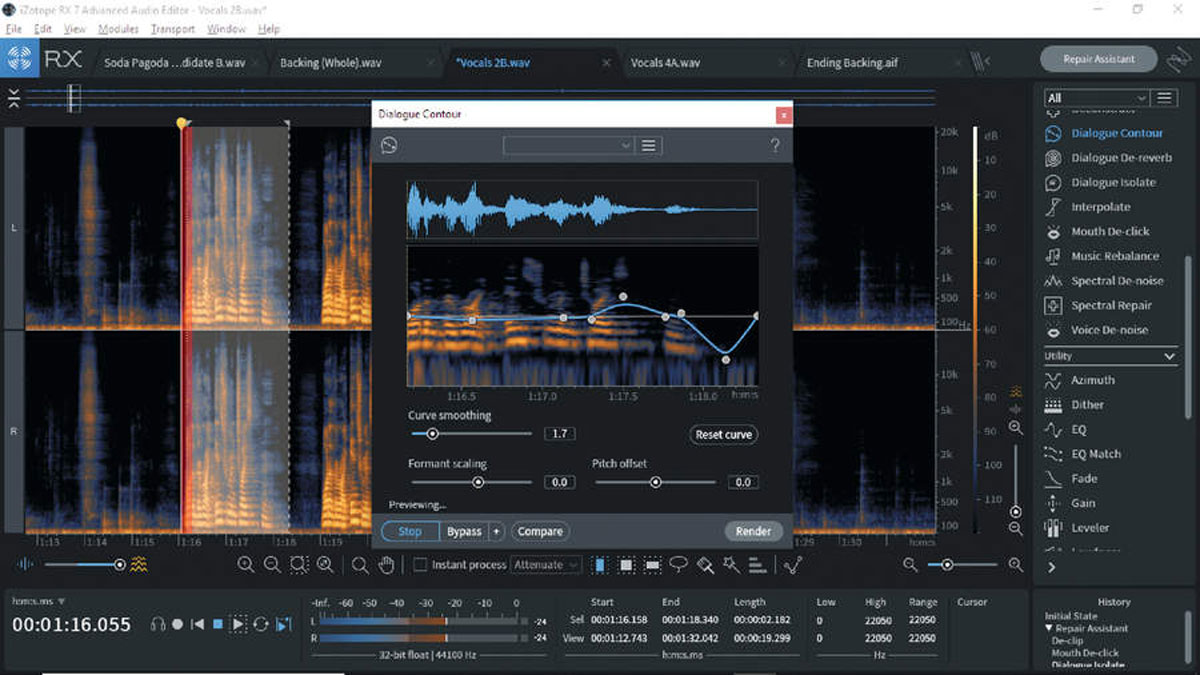MusicRadar Verdict
iZotope’s high-tech quest to make our audio better goes on; the new modules are well worth the money if you need them.
Pros
- +
Music Rebalance is magical if you need its services.
- +
Dialogue Contour and Variable Time tools are both solid solutions.
- +
Dialogue De-reverb makes short work of room sound.
Cons
- -
Repair Assistant has a limited palette of tools.
MusicRadar's got your back
Every year, Massachusetts’ iZotope brings out another version of RX, and the question arises: “What more could I possibly want from this audio and music repair and restoration toolkit?”
Every year, though, more features we didn’t think we needed are added, quickly becoming quite indispensable.
The toolset for 2018/19 sees iZotope continue to use machine learning to create its newest repair algorithms, adding the literally superhuman Dialogue De-Reverb and Music Rebalance to the system. Elsewhere, the program matures by adding multitrack editing (up to Dolby Atmos 7.1.2), new pitch and time processors, and a Repair Assistant to diagnose problems and offer solutions.
The headline feature is certain: Music Rebalance humbly takes the form of a single module alongside RX’s others, but the power lurking below is mindblowing. We’re calling it here and now: iZotope has achieved the Holy Grail of music production, unmixing stems from a full stereo mix.
The point of Music Rebalance is just that: to make minor adjustments to the levels of four elements, Voice, Bass, Percussion and ‘Other’, honing in on each with a Sensitivity dial along the way. Given a quality stereo file, you could, say, bring the drums up, take the edge off the guitars, and so on.
These minor tweaks give very, very good results, but naturally, your first inclination will be to go the whole hog and isolate some acappellas from your favourite tracks. The results here are practically magical, stripping out most of the vocals from a complex mix. There are artefacts, which is forgivable, but results are generally insane.
Note, though, that this module is foremost a problem-solver. While it can do hitherto unthinkable things, this fact just shows Music Rebalance’s perfection in the humbler task of relevelling elements in a single file.
RX 7’s Repair Assistant provides automatic detection of problems in Dialogue, Music or ‘Other’ audio, providing you with three Module Chain setup options, with three processing strengths each. This makes it quicker to dial in a brief clean-up, but for more heavily soiled audio, the strongest options don’t go far enough. In fact, neither do the included processors in Repair Assistant, which offers only Clipping, Click, Hum and Noise detection and reduction. Surely RX’s De-plosive, De-rustle, De-reverb and De-ess controls, among others, should have found a home here from the start.
Dialogue Contour and Variable Time expand RX’s pitch and time repertoire, with vocal inflection changes and timing manipulation for selected areas. Results are fair but not the most readily attainable, perhaps since Dialogue Contour has you deviating a straight line from zero, not determining an existing pitch profile to manipulate.
Dialogue De-reverb gives a better solution to the all-purpose de-reverb module; it improves on its predecessor in ease of use and quality, but more in ‘De-rooming’ than ‘De-reverbing’.
All in all, RX 7 is an impressive update, essential for newcomers who need clean-up software, and a no-brainer upgrade for those with much older versions.

A former Production Editor of Computer Music and FutureMusic magazines, James has gone on to be a freelance writer and reviewer of music software since 2018, and has also written for many of the biggest brands in music software. His specialties include mixing techniques, DAWs, acoustics and audio analysis, as well as an overall knowledge of the music software industry.
“It’s about delivering the most in-demand mods straight from the factory”: Fender hot-rods itself as the Player II Modified Series rolls out the upgrades – and it got IDLES to demo them
“For some reason, the post office shipped your guitar to Jim Root of Slipknot”: Sweetwater mailed a metal fan's Jackson guitar to a metal legend
"No one phoned me. They never contacted me and I thought, 'Well, I'm not going to bother contacting them either'": Ex-Judas Priest drummer Les Binks has died aged 73










